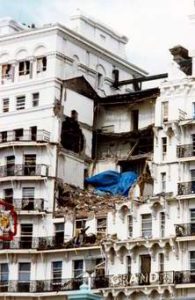The Brighton Bomb

The ringing phone on my bedside table woke me. It had just gone 4.30 am. A call at that time generally means a problem of some sort, so I answered hesitantly. I recognised my sister’s voice at once.
‘It’s me, Chris. Don’t worry, everything’s fine but I just need to tell you…” She was speaking very quickly, yet trying to sound calm:
‘Mum and Dad have phoned. They’re OK, but when you wake up you’ll hear the news. There’s been an explosion at their hotel. They think it’s a bomb.’
‘A bomb!’ I was wide awake now. ‘How big?’
‘Not sure, but it sounds bad. Half the hotel’s blown up. Everyone was in bed. They got out, but Mum was phoning me in her nightie.’
I pictured my mother in a phone box, shivering. Sirens and panic all around her as she tried to connect with us, keeping calm and controlled. She always wore long pink nightdresses. I hoped she had something on her feet. Dad would be in his pyjamas – probably striding up and down the pavement, issuing orders. They’d both be cold. Relief and concern competed as Chris told me what she knew. They’d call again when they could but it might be much later. My sister rang off and we went back to our respective worlds: my sister with her husband and children in Birmingham, me in my flat in Earl’s Court.
I slept little. I was worried about Mum and Dad even though they were safe. The Today programme finally came on, as it did every day in my world. It was 7 o’clock on Friday 12 October 1984. Beep. Beep. Beep. I was awake and listening intently. ‘The Grand Hotel, Brighton, has been bombed, people are feared dead but the Prime Minister is unharmed.’ Unsurprisingly it was major news and dominated the programme. The Grand was the best hotel in Brighton and during Conference week only senior party members and parliamentarians were able to stay there. Margaret Thatcher, the main target had escaped the blast. So had my parents, but the news omitted that most important fact.
For as long as I could remember the Tory Party Conference had been the high point of my parents’ year. It was the only time they ever went away without us three children. It was their special time together. As they moved up the ranks of the Conservative Association they were invited to sit on the Conference platform for one session each year, so we usually caught a glimpse of them on the news. From time to time one of them gave a speech, although I had never seen that televised; they would keenly tell us all about it when they came home. Their excitement was catching – the Party Conference was clearly a very special event.
These images drifted through my mind as I drove along the M4 to the Slough trading estate, and the Mars Corporate Office where I worked. I could smell the chocolate as I walked across the car park. The thought of all those chocolate bars rolling down the production line seemed incongruous in the wake of the Brighton carnage. I put on the TV in a meeting room and followed the unfolding story. The front of the hotel had been destroyed. The IRA had claimed responsibility. Four people were dead. It felt strange. The news was always so distant, but now it was a part of me. I mentioned to my colleagues that, ‘My parents were there,’ but no one really engaged. I kept it low key.
Mum phoned me mid-afternoon. They didn’t want to make the long journey home to Walsall – could they stay with me? Of course! They arrived at my flat at about 8 pm. They were wearing the clothes they got from Marks and Spencer that morning, when it opened early to fit out all those who had escaped the hotel in their night clothes. Both parents were wearing Tory blue: Dad a suit and Mum a dress. As always they looked very smart, although Mum had less jewellery on than usual. The rest was still in the bombed hotel. I poured them each a large whisky-and-water and watched and listened as they sat closely together, slowly unwinding.
A Lucky Escape
Mum and Dad were so pleased the Conference had continued and Maggie had made her speech on time. She had received a huge ovation and there had been two minutes silence for the bomb victims. Then they gradually told me about the night before. They’d been in the bar until quite late – a Conference tradition! My Mother was Area Chair of the West Midlands Conservatives, hence the privilege of staying in the Grand. The Chairs of the other 12 Areas were there too. Their rooms were all in a row across the top floor of the hotel. It was a matter of chance who was allocated which room. My parents shakily explained that they had been just one room away from destruction. Two of their colleagues weren’t so lucky, they were among those who died, just an hour or so after they had all enjoyed a drink together. A high price to pay for a few days away supporting a cause.
The photo of the hotel façade that led the news in the days that followed says it all. The U-shaped gap gouged into the hotel’s upper floors, exposing the collapsed walls and ceiling. Something that had stood for years, desolated in seconds. How quickly things can fragment.
My parents were deeply political: highly committed Tories. Their involvement in local, then national, politics was the backdrop to our family life. Such firm views inevitably influenced their choice of friends and from time to time attracted a touch of hostility. Their politics influenced my socialisation too. But that was just part of growing up. Our normality
The Brighton Bomb was different. This was extreme enmity. We were all shocked by it, especially my parents. Losing friends and being so close to the blast had a lifelong impact on them. Dad never forgave ‘the bloody IRA’, and on a more practical level they always kept a torch by their bed, wherever they were. They only went to one more conference after Brighton. The tightened security meant no more relaxing nightcaps with the Tory grandees, and they couldn’t bear the constant reminders of the bombing. Its brutal human cost.
On Reflection
That was 35 years ago, but the whole Brexit debate constantly reminds us that the ‘Irish troubles’ could easily be rekindled. And those aren’t the only troubles. The world over political debate can quickly descend into vicious discourse, which then spreads across social media. It sometimes seems but a small step away from real violence.
Our own politicians – people just like my parents – are regularly subjected to trolling, and even death threats. These aren’t coming from rare rogues but everyday people, ‘normal folk’, our neighbours and friends.
I have been looking back at my parents’ lives in politics and what I think inspired my father’s robust beliefs. Beliefs can become firmly embedded, be they religious, political, or any other type. Understanding how such beliefs shape us all is a useful exercise.
Those bombs, as dreadful as they were, form the tip of the iceberg. We also need to watch out under the surface. For those layers of hostility that creep across our communities, nurtured by digital drip feed until they become our new normality. As individuals, we can’t easily stop extremist bombers, but we can defuse those everyday disputes, with calm and constructive dialogue.
That is certainly something our politicians should consider: criticise less and understand more. It might not make headlines, but it could preserve peace.
